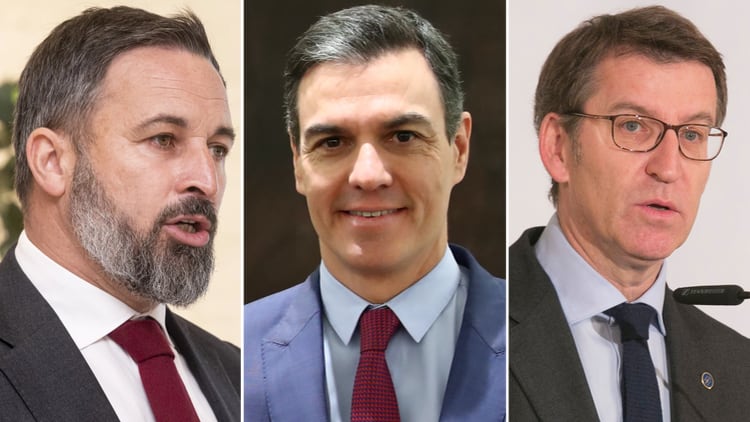Ángel Collado
The race to propose populist measures has been imposed at the start of the election campaign for the elections on 23 July, both in the parties of Pedro Sánchez’s left-wing coalition and in the far-right aspirant, Vox, to enter the government hand in hand with the PP.
The socialist and communist parties and the party headed by Santiago Abascal are launching groundbreaking and opposing programmes, except in economic policy, where Vox is now aiming for state interventionism and a nationalist anti-capitalism inspired by the model of Alternative for Germany, the ultra-right party that is moving up to second place in its country, with 20 per cent of the vote according to all the polls.
Vox has included in its electoral offer the classic and well-known recipes for dismantling the most ideological laws approved by Sánchez’s social-communist government, an objective in which it partially coincides with the Popular Party, but at the same time confirms its anti-liberal turn in economic matters, which radically distances Abascal from the positions of Alberto Núñez Feijóo.
By adding uncertainty to the possibility of pacts on the right after the elections, the great beneficiary of the populist radicalism exhibited by Vox in the campaign turns out to be Pedro Sánchez because it serves as fodder for his basic campaign discourse, that of instilling fear of the possible arrival of the extreme right to power. And if it does not work to halt his setback at the polls, it may later be useful to block the investiture of Feijóo as his successor in the presidency of the Government, in the event that the results of the elections are not clear or depend on the entry of Abascal’s party into the Executive.
Vox competes with the PP in promises of tax cuts, but, in a more populist style, without explaining how it would balance the state’s accounts, it offers two unique tax brackets for Personal Income Tax according to income, 15 or 25 per cent, according to a limit set at 70,000 euros per year. This would almost halve the current tax burden.
Abascal also intends in his programme, as if Spain were not in the European Union, to abolish VAT in specific economic sectors, impose special tariffs on Moroccan products or resort to specific regulations against multinational companies, large shopping centres or technology companies.
If on the left Sánchez and Yolanda Díaz at the head of Sumar compete in proposals for subsidies and aid that increase the public deficit through spending, Vox surpasses or sweeps away Feijóo’s promise to alleviate the tax burden on middle and lower incomes.
Before putting its economic turnaround in writing, Abascal’s party gave a first warning by leaving two of its most qualified MPs with more liberal positions out of the candidates for Congress: the businessman Víctor Sánchez del Real and Rubén Manso, an inspector at the Bank of Spain. Both were early Vox militants, when the new party was emerging as a conservative option to the right of the PP.
Manso drew up the first economic programme of Abascal’s party, of a liberal nature, within the parameters of the EU and far removed from the “right-wing anti-capitalism” that triumphs in Alternative for Germany.
Also in the populist style, as in the extreme left, Vox’s greatest contradiction is between its discourse against the system and its eagerness to hold positions and salaries in the same system. Abascal’s supporters propose in their programme to abolish or prune the state of the autonomous regions as much as possible, while at the same time demanding that the PP enter all the regional governments and a proportion of regional councils that triples the percentage of votes and seats obtained at the ballot box.
Vox demands to be in autonomous regional executives even where, as in Murcia, its abstention is enough for the PP to form a government. And if they are denied access to office they vote with socialists and communists to prevent the Popular Party, the clear winner at the polls on the verge of an absolute majority in the region, from taking the lead in the autonomous region. Even if the elections have to be repeated. A warning from Abascal, like the anti-liberal economic programme, of what can await Feijóo after 23 July if he does not make the elections clear.







